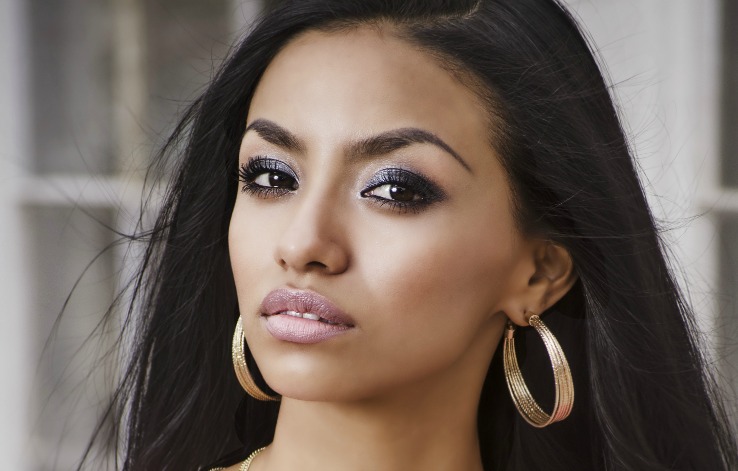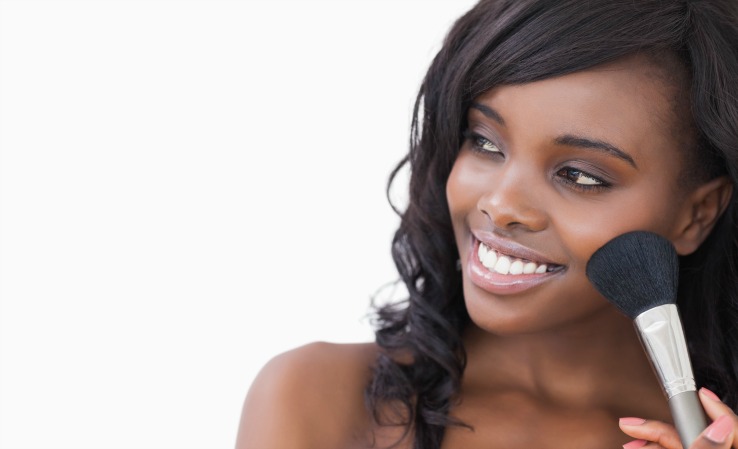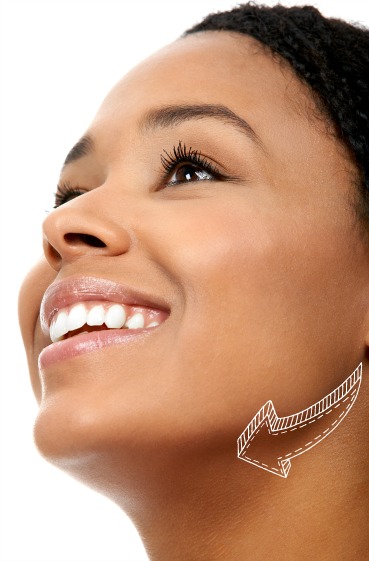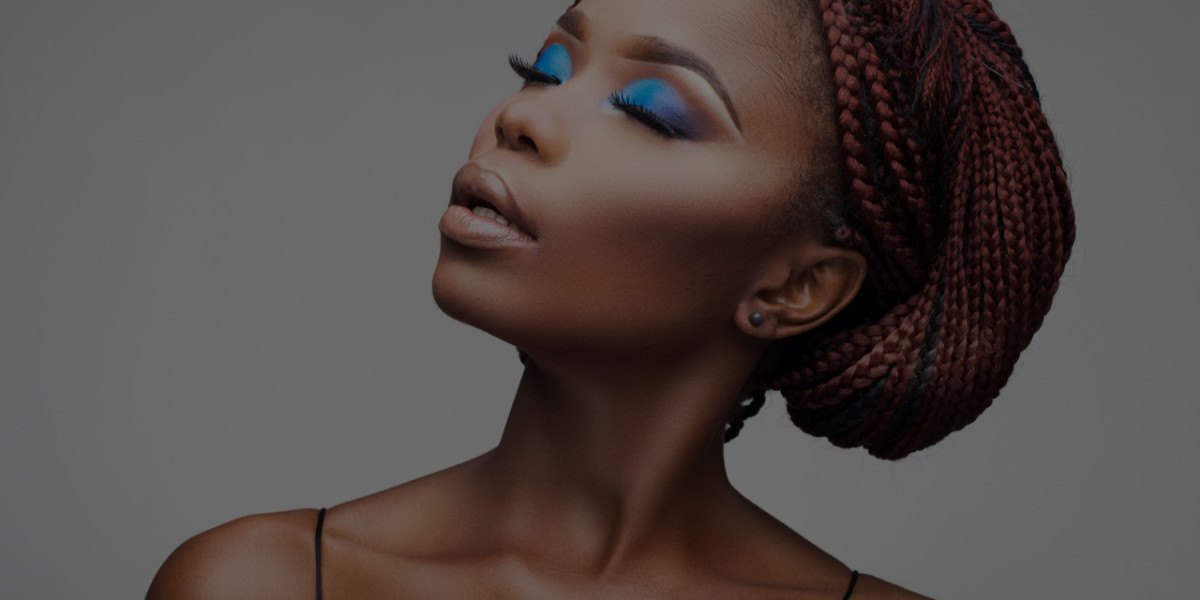As makeup beginners, many people struggle with matching foundation products to different skin tones correctly. This is particularly true, however, for ethnic women and people with deeper skin tones. Why is it that people of color and individuals with olive toned skin have a much more difficult time finding products that blend well on their faces than people with fairer complexions? What can a person do to ensure that they purchase foundation that truly suits their skin and looks natural?
As a makeup artist, you will apply foundation to people of all different skin tones, including individuals with ethnic skin. You will need to know why people with deeper skin tones struggle with color matching, what they (and you) can do to find a proper match, and what types of foundation products they should look for.

Why is it hard to color match deep skin tones?
When it comes to cheaper or lower quality makeup brands, ethnic women and people with deeper skin tones might find it nearly impossible to color match foundation properly. There are two primary reasons for this trouble. Firstly, cosmetic brands that are not specifically produced for professional use don’t always have a large selection of deep toned makeup to begin with. If you take a look at some drug store brands, you might notice that their color scale features many more shades of beige or light beige makeup than it does brown or very deep brown. This means that, right from the beginning, people of color have a limited selection to work with. If a generic makeup brand only offers two shades of very deep brown makeup, a black woman might find that neither matches her skin quite right, and she will have to search other brands instead that have a larger selection of ethnic makeup.
Besides lack of selection, ethnic women and people with deeper skin tones can also have trouble color matching foundations because of the way cheaper products are formulated. Some non-professional brands mix their foundation colors by starting with one particular shade of light beige and simply adding deep pigment in various amounts to create deeper colors. Mixing colors this way doesn’t address the undertones of a person’s skin, particularly a person of color, because the base tone of the makeup is the same in every mixture no matter how deep the color of the foundation is.
Tone, undertone, and color
What do we mean when we say that the tone of a cheap foundation may not match the ‘undertone’ of ethnic skin? If you look at any person’s skin, you’ll see that it’s never the same consistent shade all over their body. This is especially true for people with deeper skin tones. For most people, the palms of your hands and the insides of your forearms are not the exact same color as your face or neck. The lighter skin tone that you see in some places, particularly on the insides of your wrists, is your undertone. When you are matching foundation to a person’s skin, you have to ensure not only that the color of that foundation appears to match the color on the top of their skin, but also that the tone of that foundation matches the undertone of their skin.

Turn your arm over and look at the inside of your wrist. If your veins appear to be a bluish or purple color, then your skin has a cool undertone. Usually, people with cool undertones have fairer skin. If your veins appear greener, then you have warm undertones, which is more characteristic of people with deeper skin. People who look at their wrist and can’t tell how their veins look either way probably have a neutral undertone. Recognizing your undertone is important because it helps you color match with proper shades of professional foundation. Where cheap makeup might be mixed from one single base color, professional products are mixed from bases with different tones- cool, neutral, and warm. Pigment is then added to achieve different shades of color in each tone.
When a person with an ethnic skin tone tests professional foundations, they can first determine which tone of foundation suits the undertone of their skin, and then they can match the color. This will give them a much more thorough and balanced match. Individuals with fairer skin should also know their undertone for the most effective foundation match, but they’re still more likely to find a decent color match based solely on the larger variety of beige and light beige shades available. For deeper skin tones, finding a good balance between tone and undertone, as well as a good color match, will provide the most realistic look when the makeup is blended into the face.
Matching foundation
As we mentioned, the skin on the face can differ slightly in color or shade from the skin elsewhere on the body, particularly for those with deep skin tones. As a result, the best place for people of color to test foundation is along their jaw line. If your model is a black woman and you swatch the foundation on the back of her hand, you might find that it doesn’t match precisely when you blend it into the skin on her face. The best way to determine a match is to choose three shades that are very close- one that is a little lighter, one that is a little deeper, and one that looks like it might match just right. Swatch these three colors next to each other for comparison along your model’s jaw and let them sit for ten to fifteen minutes so that the makeup can set properly into the oils of the face. Do not blend the makeup! You want to see which shade will set well into the skin color on its own.

Keep Learning! Techniques like finding the proper color match for ethnic skin tones, whether for yourself or someone else, can take practice.

Awesome,I have found that a lot of popular brands lack foundations that match darker skin tones. One important piece of information that I really would like to know is… what brands do provide the dark skin foundations?
Hi Terri, thank you for your comment! There’s been a lot of controversy in the cosmetic world when it comes to brands advertising makeup that is great for all skin tones, when in reality it is not the case. We would advise avoiding well-known drug store brands and instead favour professional brands that actually work with color wheels or are specifically created and run by women of color and are known for good products. Some good brands that carry a wide variety are MAC’s professional line, and Iman Cosmetics. You may also want to check out black|Up Cosmetics, specifically created for women of color. 🙂 Hope that helps!
I know that Shea Moisture has recently come out with a cosmetic line.
I found this very helpful! I learned some things I didn’t know. The L’Oreal True Match is a pretty good affordable brand. They now have darker shades. I wear C8 Cool. They have two other shades C9 Deep Cool and C10 Espresso, being the darkest…a rich deep chocolate color. It is hard to find makeup for darker toned women and it shouldn’t be that way but it is. MAC is an amazing brand but everyone can’t afford MAC. I think the L’Oreal brand is a nice alternative for those who want to wear makeup without spending too much.
This was such an honest read and I’m glad I came across it. I tend to find that I have a lot more difficulty when trying to find cosmetics now because I have become very conscious about the chemicals that are put into the cosmetics itself. I have found a company galled GlamNatural and they sell amazing healthy products and are all about women health. You will see that the Bronze 1 and Bronze 2 are of the best shades. The photos do tend to not show the exact color but I have used Bronze 1 and Bronze 2 for contouring and much more ! Id really check them out !
I was told by MAC I was a NW55 – I was truly a NW58/ 9.0 in the Studio Fix Fluid . I’ve notice that every makeup from MAC, Revlon Colorstay, and Covergirl makes my skin looks orange. I believe I have a neutral undertone. I still have not found anything from MAC, Black|UP, IMAN, etc that fits my skin tone w/o making it look orange. I’m not a deep dark skin but I’m dark skinned. Any recommendation?
Hi Felicia!
Sorry to hear you’re having trouble with makeup tones :-(. I was going to recommend IMAN, but you mentioned you’ve already tried it. Have you looked into having custom shades made for your skin tone? One of QC’s preferred partners is Three Custom Color Specialists. They mainly specialize in recreating discontinued shades, etc. but they might be able to work with you to create a custom concealer/foundation tone for your skin. Might be worth checking them out…
Hope this helps!
Hi Felicia,
Just was doing some reading through the blogs and came across your comment. If you haven’t already found something that works for you try Sacha Cosmetics cream to powder foundation which is a Trinidadian made product for WOC and also try Black Opal’s Stick foundation which happens to be a staple in my kit. I agree with you about MAC it does leave you looking orange and I find it to be a bit cakey once it’s set . Hope this helps:)
Your foundation tips are very useful. I’ll try them out next week. Thank you so much